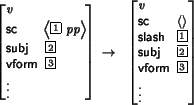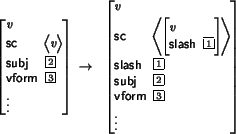
[b.]

In the previous section, we have introduced a rule for verb-initial and subject-initial main clauses. The first phrase in a main clause can also be a (non-subject) complement or a modifier. This is typically the case for (non-subject) WH-questions. Sentences with a `fronted' complement are treated as instances of a non-local dependency construction (where the dependency is mediated through SLASH). In sentences with a fronted modifier, it is assumed that the first element modifies the remainder of the clause, and thus a local treatment can be given.
Examples of sentences with a fronted complement are given in (3).
[a.] Naar welk station wilt u reizen?
To which station do you
want to travel
[b.] De laatste trein kunt u nog halen.
The last train, you can
still catch
These examples are handled by means of a lexical COMPLEMENT-EXTRACTION rule applicable to
verbs, and a syntactic HEAD-FILLER-rule for combining the
fronted element with a ques-phrase containing a non-empty SLASH-value. The COMPLEMENT-EXTRACTION rule can apply in
two ways: First, it can take a complement from SC and put it on
SLASH (4a). This implies that this complement will not be found
locally, but that it will be unified with an element in `fronted'
position. Second, it can make the SLASH value of a verb
reentrant with the SLASH value of one of its complements (4b).
This implies that true non-local dependencies are possible, as
the head of a phrase can pass on information about missing elements
from one of its dependents. If the complement-extraction rule does not
apply, the SLASH value of the verb, as well as the SLASH value of all
its complements, is set to
![]() (the empty list).
[a.]
(the empty list).
[a.]

[b.]

An example of a derivation involving SLASH is given in
figure 12. The COMPLEMENT EXTRACTION rule has
applied to halen (to catch) to produce a verbal sign with an empty SC-list and an np on SLASH. A verbal trace contains a
reentrancy between its SC-list and its VSLASH:VSC-list. When
the verbal trace combines with halen,
the information that halen has an np on SLASH will
therefore also be instantiated on VSLASH:VSC. This information
is passed up to the resulting verb phrase. The complement
extraction rule also applies to the finite verb kunt (can), but in
this case it establishes a reentrancy between the SLASH value of
the verb on the SC-list of kunt and the SLASH-value
of kunt itself. The VFIRST rule unifies the SC-list
of kunt with the VSLASH:VSC-list of the verb phrase
halen ![]() , and thus, SLASH (of the verb on SC
of kunt, and thus on kunt itself) is instantiated as
, and thus, SLASH (of the verb on SC
of kunt, and thus on kunt itself) is instantiated as
![]() . This information is passed on to the resulting
ques phrase, which can then be combined with the initial
np using the TOPICALISATION rule in 25.
. This information is passed on to the resulting
ques phrase, which can then be combined with the initial
np using the TOPICALISATION rule in 25.
It should be noted that our account of non-local dependencies differs from earlier slash-based accounts, such as those in Gazdar et al. [22] and Pollard and Sag [36] in that it does not make use of a FOOT FEATURE principle. Instead, we adopt the approach of Sag [38], who imposes the canonical constraint that the SLASH-value of a head is the set-union of the SLASH-values of its daughters. An EXTRACTION lexical rule can be used to remove an element from SC (COMPS) and to add this element to the set of elements on SLASH. In our implementation, we have made several simplifying assumptions. First, SLASH is not a set, but a list. Second, this list can contain at most one element. This assumption (which has the effect of restricting the number of `missing' elements from a phrase to at most one) is too restrictive for a highly limited number of cases in English, but appears to be valid for Dutch. Third, instead of imposing a general constraint that SLASH must be the concatenation on the SLASH values of all elements on SC, we allow the COMPLEMENT EXTRACTION rule to unify the value of SLASH with one specific element on SC. We have to make this assumption, as the more general alternative requires the use of delayed evaluation, something which we wish to avoid in this grammar, or difference lists. While the latter alternative is possible within the present formalism, it also introduces a number of complications which are avoided in the present implementation. The fourth and final simplification is that COMPLEMENT EXTRACTION and SLASH feature passing is only possible for verbs. This is certainly too restrictive, as extraction out of subordinate clauses of type sbar ( welke trein zegt Gertjan dat Rob gemist heeft?, which train does Gertjan say that Rob has missed) and out of pps ( Waar gaat deze trein naar toe?, Where does this train go to), and a number of other types of phrase is possible as well.
Sentences where the first phrase is a modifier are dealt with without
appealing to SLASH. Instead, it is assumed that in sentences
such as (5), the fronted elements modify the following
ques phrase. This requires an additional (mod-topic) rule, given
in (26).
[a.] Hoe laat gaat de volgende trein naar Zwolle?
When does the
next train to Zwolle leave?
[b.] Woensdag moet ik om tien uur in Zwolle zijn.
Wednesday, I
must be in Zwolle by ten o'clock.